Overview
The article "10 Essential Therapy Questions for Trauma Recovery" focuses on the vital role of personalized therapy questions in fostering effective trauma recovery. It highlights how tailored questions can enhance emotional awareness and promote self-reflection. By creating a supportive environment, these questions contribute to improved therapeutic outcomes for individuals on their healing journey.
Have you ever felt overwhelmed by your past? This article invites you to explore how personalized questions can help you navigate your emotions and experiences. As we delve deeper into this topic, you'll discover the profound impact that a compassionate approach can have on your recovery process.
In addition to enhancing self-awareness, personalized therapy questions cultivate a nurturing space where individuals feel understood and valued. This supportive atmosphere is essential for fostering resilience and encouraging growth during challenging times.
Ultimately, the article serves as a gentle reminder of the importance of seeking therapy and the transformative power of tailored questions in the healing journey. It encourages you to consider how personalized support can guide you toward a brighter future.
Introduction
In the realm of trauma recovery, the journey toward healing is often as unique as the individuals embarking on it. Have you ever felt overwhelmed by your past? At The Emerald Couch, therapy is redefined through a personalized lens, where each question posed serves as a tool for deeper understanding and connection.
By moving beyond traditional approaches, the emphasis on tailored therapy questions not only enhances emotional exploration but also cultivates a safe space for clients to navigate their experiences. With a focus on mindfulness and self-compassion, this innovative practice empowers individuals to reflect on their feelings, assess their support systems, and visualize a brighter future.
As we explore this further, the article delves into the transformative power of personalized therapy, illustrating how tailored interventions can significantly improve recovery outcomes and foster resilience in those facing the challenges of trauma.
The Emerald Couch: Tailored Therapy Questions for Trauma Recovery
At The Emerald Couch, therapy is not a one-size-fits-all model; it’s a compassionate journey tailored to your unique needs. Have you ever felt overwhelmed by your past? Each therapy question posed during sessions is thoughtfully designed to address the distinct experiences of individuals navigating trauma. This personalized approach not only deepens therapists' understanding of your emotional landscape but also cultivates a safe and supportive environment essential for healing.
Research indicates that conventional randomized controlled trial designs fall short in identifying optimal treatments for diverse patient populations, underscoring the necessity for personalized treatment approaches. Customized therapy questions significantly enhance recovery outcomes, enabling you to explore your emotions and experiences with greater clarity and support.
often incorporates mindfulness practices, which serve as powerful tools for developing awareness of thoughts, emotions, and bodily sensations. Techniques such as meditation and mindful breathing empower you to observe your emotions without judgment, fostering profound self-discovery and inner growth.
Mindfulness is integrated with various treatment methodologies, including:
- Dialectical behavioral practices (DBT)
- Acceptance and commitment approaches (ACT)
- Cognitive behavioral techniques (CBT)
- Exposure and response prevention (ERP)
The benefits of mindfulness practice include improved stress management, emotional regulation, and heightened self-awareness—key elements for effective treatment. This collaborative approach enables you and your therapist to co-create customized interventions that specifically address your personal challenges.
By prioritizing tailored treatment and incorporating mindfulness, The Emerald Couch exemplifies a commitment to high-quality, evidence-supported care, nurturing resilience and growth as you embark on your recovery journey.
Reflect on Your Emotions: What Feelings Are You Experiencing Right Now?
Encouraging individuals to reflect on their current emotions is a vital step in uncovering underlying issues that may require attention through therapy questions. Examples of therapy questions include 'What feelings are you experiencing right now?' invite individuals to pause and assess their emotional state. This practice not only fosters self-awareness but also allows therapists at The Emerald Couch to tailor their interventions, thereby improving the individual's healing journey.
At The Emerald Couch, we understand that finding the right therapist is essential for effective treatment. Our tailored evaluations ensure that individuals are paired with the most appropriate provider. If we cannot deliver the correct treatment, we offer a refund for your session. This commitment to ensuring the right fit highlights our dedication to client-centered care.
Research shows that emotional awareness greatly enhances treatment outcomes for individuals who have experienced distress. For instance, individuals who engage in emotional reflection are more likely to identify and articulate their feelings, leading to more effective therapeutic strategies. Notably, a study found that 45% of individuals with a history of mental illness receive treatment while incarcerated, highlighting the critical need for emotional assessment in various contexts, including those facing significant life challenges.
Moreover, case studies reveal that veterans in local jails often report mental health issues, underscoring a critical gap in care. By addressing emotional awareness in therapy, practitioners at The Emerald Couch can offer personalized support that resonates with individuals' unique experiences, particularly for veterans navigating their recovery. Integrating emotional reflection can close this divide, enabling individuals to manage their difficulties with increased resilience and understanding. As noted, individuals who have healthcare coverage upon release from incarceration are more likely to engage in services that reduce recidivism, further emphasizing the importance of emotional awareness in fostering .
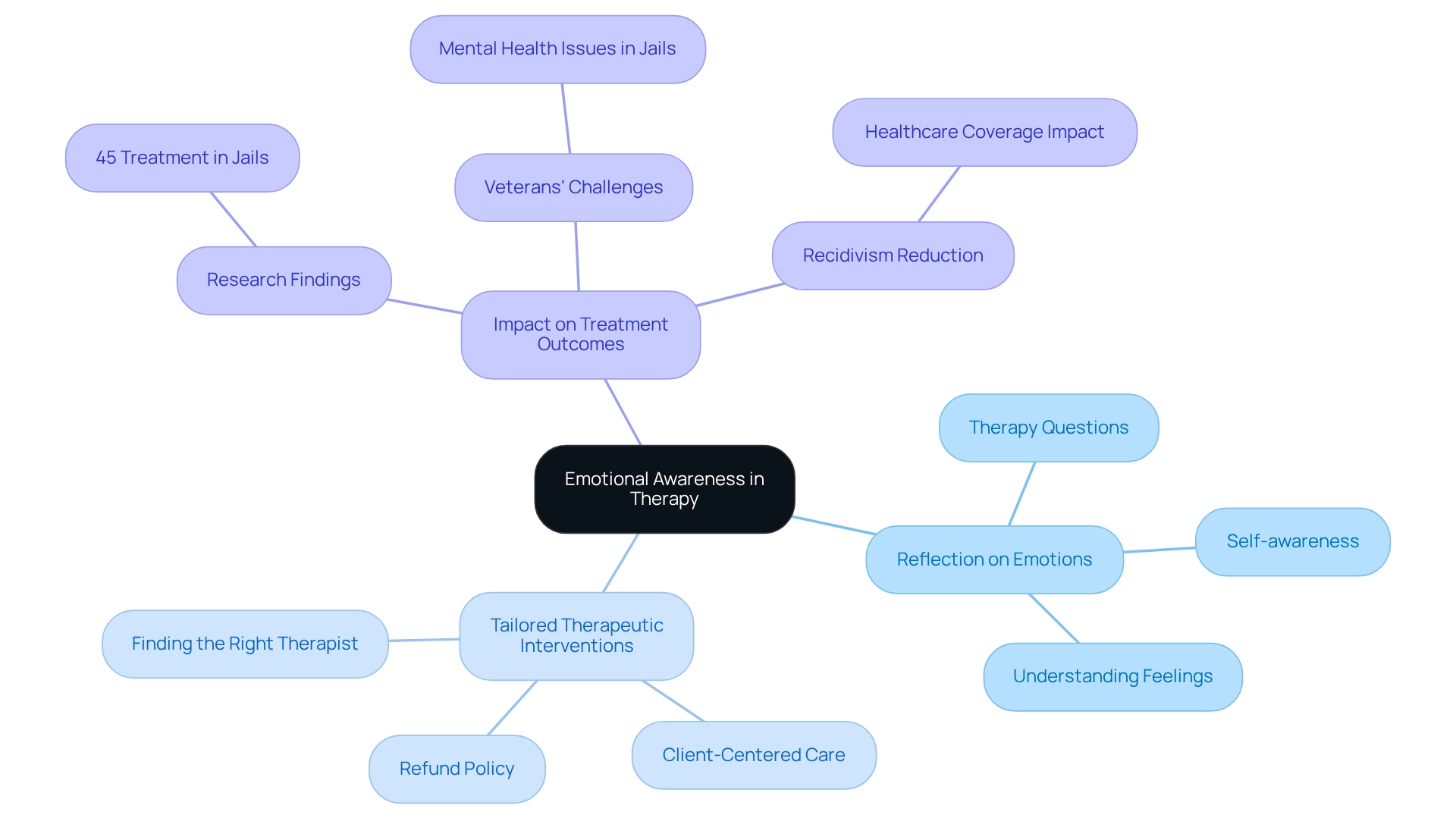
Explore Your History: How Have Past Events Influenced Your Current Mindset?
Understanding how past experiences shape our present attitudes is crucial for effective recovery. Have you ever wondered, 'How have past events influenced your current mindset?' Reflecting on therapy questions can help individuals connect their experiences to their current emotions and actions. This exploration often uncovers profound insights that can guide therapeutic strategies and promote healing.
Integrating mindfulness into this journey can greatly enhance mental health and personal growth. Rooted in ancient Eastern philosophies and popularized in the West by pioneers like Jon Kabat-Zinn, mindfulness is defined as awareness that arises from paying attention, on purpose, in the present moment, without judgment. Techniques such as breath awareness and body scans empower individuals to cultivate a deeper sense of awareness and presence, which is especially vital for those who have faced distress. By intentionally recognizing and accepting their current experiences, individuals can navigate their emotions and thoughts more effectively, fostering a richer understanding of how past events influence their present mindset.
Research indicates that psychological distress can lead to learned helplessness, where individuals feel immobilized in decision-making long after the distressing experience has passed. Therapy questions play a pivotal role in helping individuals reclaim control over their lives, counteracting the effects of this helplessness. Mindfulness practices, including grounding activities and focused breathing, can assist in this empowerment, enabling individuals to stay anchored in the present and alleviate anxiety.
Statistics reveal that recovering from sleep issues, often stemming from distressing experiences, can take months or even years after substance abstinence. This underscores the importance of addressing historical influences on mental health. Many strategies beyond medication, such as good sleep hygiene and relaxation techniques, can significantly enhance well-being. Recognizing that recovery from sleep disturbances is a long-term process highlights the need for patience and comprehensive care.
Expert opinions emphasize the importance of disconnecting from social media and other stressors during . Dr. Annie Tanasugarn suggests that allowing oneself to take a break from these influences is a vital aspect of self-care. By examining their histories and integrating mindfulness techniques, individuals can gain a deeper understanding of how past occurrences shape their present mindset, fostering resilience and personal growth in counseling.
Define Your Goals: What Do You Want to Achieve Through Therapy?
Establishing recovery objectives is a collaborative effort that significantly enhances participant involvement in trauma healing. By asking questions such as, 'What do you want to achieve through therapy?' professionals inspire individuals to articulate their aspirations, fostering a sense of ownership over their healing journey. This aspect is especially crucial for trauma survivors who may grapple with feelings of shame or responsibility for their past experiences. At The Emerald Couch, we prioritize building a relationship of trust before delving into any triggering events, ensuring that individuals feel safe and supported throughout their journey.
Research shows that structured goal-setting can lead to improved psychological outcomes and greater patient satisfaction, especially in rehabilitation contexts, as highlighted in the case study titled 'Evidence for Goal Setting.' This review indicates that can yield enhanced psychological outcomes and increased patient satisfaction across various rehabilitation settings.
Clear objectives not only guide the therapeutic process but also serve as benchmarks for progress, helping individuals remain motivated and focused. This approach aligns with the principles of trauma-informed care, emphasizing collaboration and empowerment to achieve better outcomes. As noted by SAMHSA, 'This collaborative and integrated method of care that considers past experiences ultimately results in enhanced outcomes and an improved quality of life for those impacted by such experiences.' Furthermore, integrating methods like written exposure treatment can be effectively supported by goal-setting, as it aids individuals in reframing traumatic memories and alleviating distress. At The Emerald Couch, we acknowledge that each person's experience with distress is unique, and we offer a variety of treatment options, including EMDR, Cognitive Processing Therapy (CPT), and Prolonged Exposure, to ensure that individuals find the right approach for their needs. Ultimately, when individuals actively participate in setting their therapy questions, they are more likely to engage deeply in the healing process, paving the way for meaningful recovery. Current trends in defining therapy goals also reflect a growing recognition of personalized approaches that address individual needs, further enhancing engagement and effectiveness in trauma treatment.
Have you ever felt overwhelmed by your past? If you're ready to take the first step towards healing, reach out to us at The Emerald Couch today.
Identify Coping Strategies: What Techniques Do You Use to Manage Stress?
Understanding how individuals manage stress is crucial for creating . By posing therapy questions such as, 'What techniques do you use to manage stress?' therapists encourage individuals to reflect on their coping mechanisms, helping them differentiate between healthy and maladaptive strategies. This reflection not only fosters self-awareness but also opens the door for discussions about enhancing current methods or introducing healthier alternatives, particularly through therapy questions.
At The Emerald Couch, we prioritize collaborative, customized treatment planning, ensuring that each person receives mental health care tailored to their unique needs. With rising concerns about mental and behavioral health, as more Americans report experiencing anxiety and high stress, the importance of effective coping strategies becomes increasingly clear.
Mindfulness techniques, such as breath awareness and body scans, can be integrated into therapy to enhance emotional regulation and personal growth. For example, maintaining a stress journal can assist clients in pinpointing common stressors and developing personalized coping strategies, reinforcing the notion that this practice serves as a valuable tool in managing stress.
Moreover, case studies demonstrate that embracing a balanced lifestyle—including nutritious food choices, sufficient sleep, and avoiding harmful substances—can significantly enhance stress management and emotional well-being, as highlighted in the case study titled 'Maintain Balance with a Healthy Lifestyle.'
By recognizing and evaluating these coping strategies, therapists at The Emerald Couch can offer better support to trauma survivors on their recovery journey, ultimately empowering them to envision a life unburdened by their past. As Nelson Mandela wisely stated, 'It always appears unattainable until it’s accomplished,' reminding us that overcoming obstacles in treatment is a journey worth undertaking.
Communicate Your Needs: What Do You Need from Your Therapist?
Successful treatment relies on strong communication between individuals and counselors. Posing questions such as 'What do you need from your therapist?' empowers individuals to express their expectations and preferences, fostering a collaborative therapeutic relationship. This open conversation is vital for customizing treatment to address personal requirements, greatly improving intervention effectiveness at The Emerald Couch.
At The Emerald Couch, we understand that participating in counseling is a significant leap of faith, particularly for newcomers. It’s important to recognize that counseling isn’t a one-size-fits-all solution; it’s a personalized journey that requires time and trust. Therapy is not for 'crazy people,' nor is it a one-time appointment to solve all your problems. It is a process that may feel unsettling at first, but it is a safe space for you to share and be raw, knowing that you are not alone. Have you ever felt overwhelmed by your past? Research indicates that clear communication can lead to enhanced customer satisfaction and outcomes. For instance, a study emphasized that individuals who actively communicate their needs report higher levels of engagement and progress in treatment. Moreover, including patients' language in session notes not only enhances interactions but also aids in creating more thorough treatment plans.
We provide a complimentary 30-minute consultation to assist in better understanding your needs and customizing our services accordingly. Most individuals begin to feel better or observe some progress within 4 - 6 weeks, and we decide together on your objectives and when you believe you have achieved them.
Case studies in trauma treatment show that effective communication can be transformative. For instance, art-based healing has surfaced as a significant resource, especially for marginalized populations, enabling individuals to convey their feelings in non-verbal manners. As Sarah Jio noted, 'Life is full of challenges. We all have them. Art has helped me through my own deep valleys.' This approach has proven effective in reaching individuals who might otherwise struggle to access traditional mental health services, thereby enhancing their overall psychological health, especially when addressing therapy questions that emphasize the necessity of expressing needs. Therapists emphasize that when individuals answer therapy questions regarding their expectations, it results in . As one therapist observed, 'Comprehending what individuals require is essential for establishing trust and promoting healing.' By prioritizing communication and allowing individuals' words to convey their meanings, people can navigate their therapeutic journeys more effectively, ultimately fostering resilience and growth.
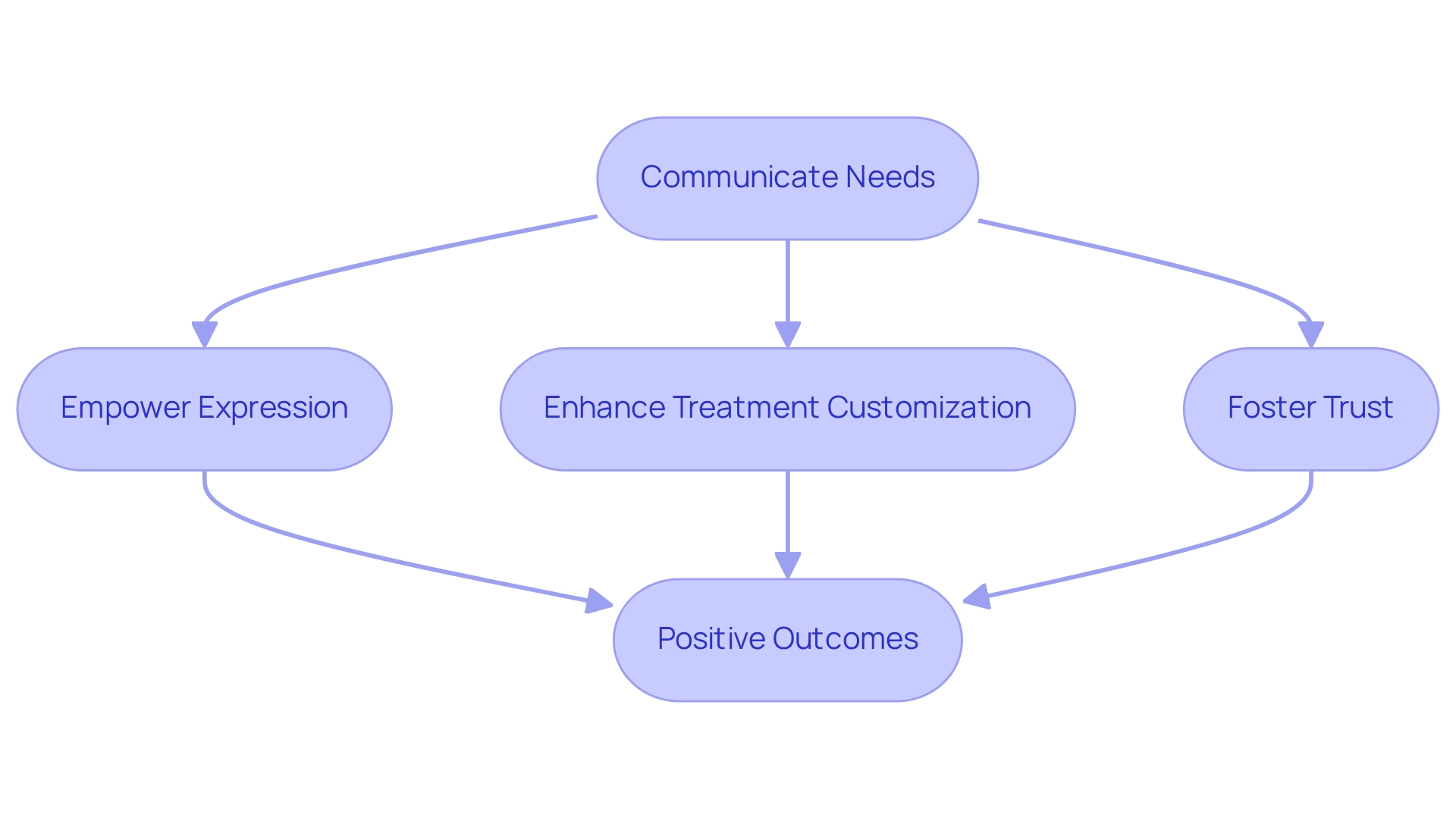
Assess Your Support System: Who Can You Rely On for Support?
Evaluating your support system is essential on the journey of trauma recovery, especially for overachievers who often find it challenging to prioritize their own needs. Have you ever considered some therapy questions, such as, 'Who can I rely on for support?' This question is crucial as one of the therapy questions that help individuals identify the reliable people in their lives. Recognizing not only empowers you but also fosters a sense of security and connection, both of which are vital for effective healing. Research shows that strong social support significantly enhances mental health outcomes for trauma survivors. For instance, studies indicate that individuals with robust support systems report up to 50% lower levels of anxiety and depression compared to those without such networks. This illustrates the profound impact of community and connection on emotional well-being.
As we explore this further, mindfulness practices can enhance the effectiveness of these support systems. They help you slow down and become more present, allowing for deeper engagement with your support networks. Mindfulness can be incorporated into treatment through methods like meditation and mindful breathing, which assist in observing your thoughts and emotions without judgment. Case studies reveal that those who actively engage with their support networks experience a more profound sense of resilience and growth. One significant case study emphasized that individuals who participated in group sessions alongside their personal support systems reported a 60% increase in their coping skills. This reinforces the idea that healing is not a solitary endeavor but a collective journey.
By evaluating and nurturing these connections, you can establish a strong foundation for your recovery, clearing the path for a healthier, more rewarding life. Remember, you are not alone in this journey, and reaching out for support is a courageous step towards healing.
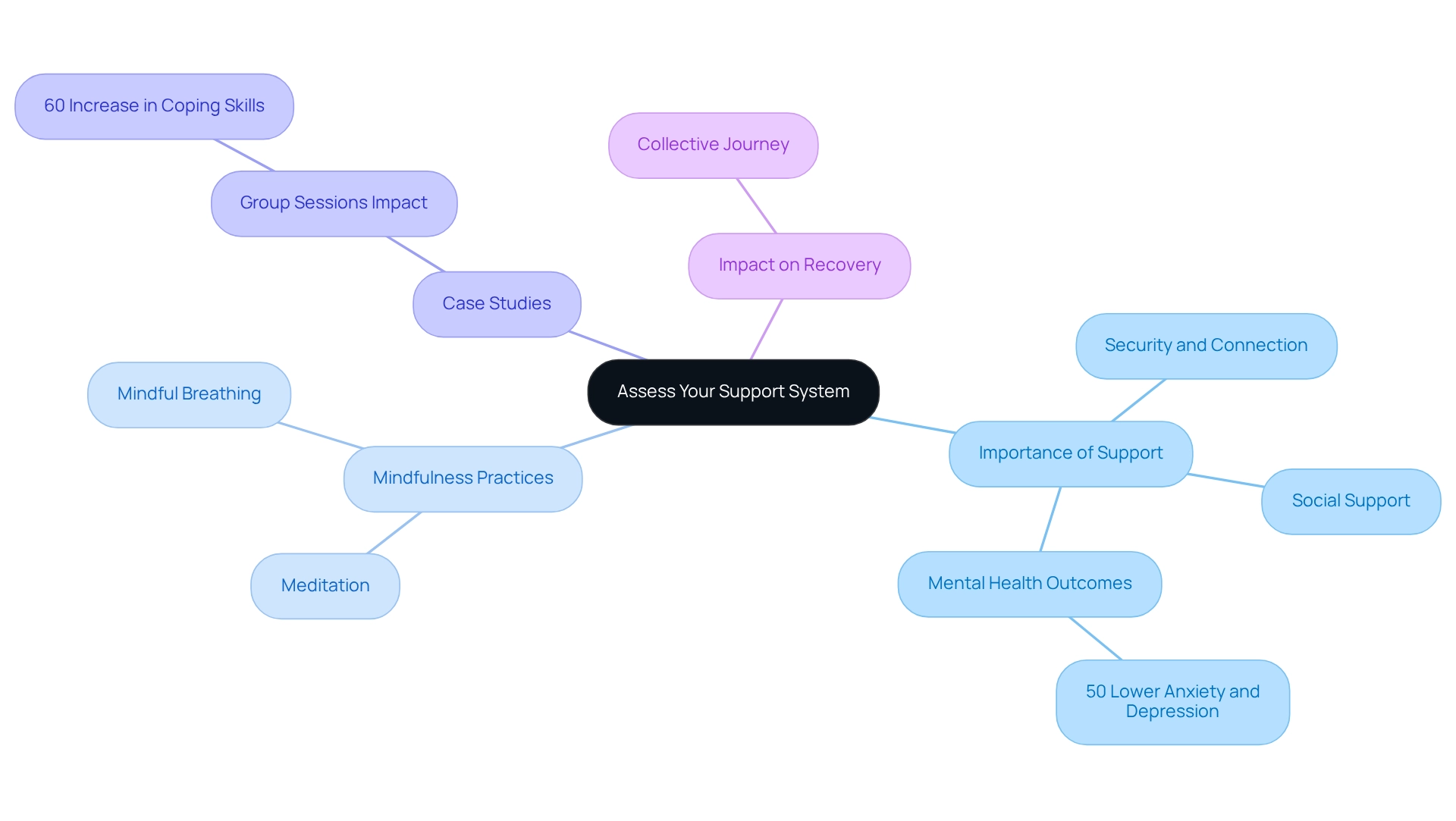
Evaluate Your Progress: How Far Have You Come in Your Healing Journey?
Assessing progress is essential for maintaining motivation in treatment. At The Emerald Couch, your journey begins with an intake session, where we collaboratively develop your custom treatment plan, defining what success looks and feels like for you. , like 'How far have you come in your healing journey?', are important for self-assessment and encourage you to evaluate your progress and achievements. This process not only reinforces your dedication to treatment but also includes therapy questions that highlight areas that may need additional attention or modification in your care plan.
Recent studies show that regularly contemplating therapeutic progress can greatly boost motivation, as individuals like you acknowledge advancements toward recovery. For instance, research indicates that those who actively participate in assessing their progress report higher satisfaction with their treatment and a greater sense of empowerment in their healing journey. Furthermore, professional insights reveal that reflecting on one's recovery process enhances resilience, allowing you to envision a future free from past hardships.
By incorporating therapy questions into reflective practices, you can cultivate a deeper understanding of your experiences, ultimately leading to more effective and tailored treatment outcomes. Additionally, for those who may feel overwhelmed, anxious, or burnt out, our approach at The Emerald Couch prioritizes your needs, helping you navigate these challenges. By inviting feedback on its usefulness, this section encourages your engagement and adds an interactive element to the content.
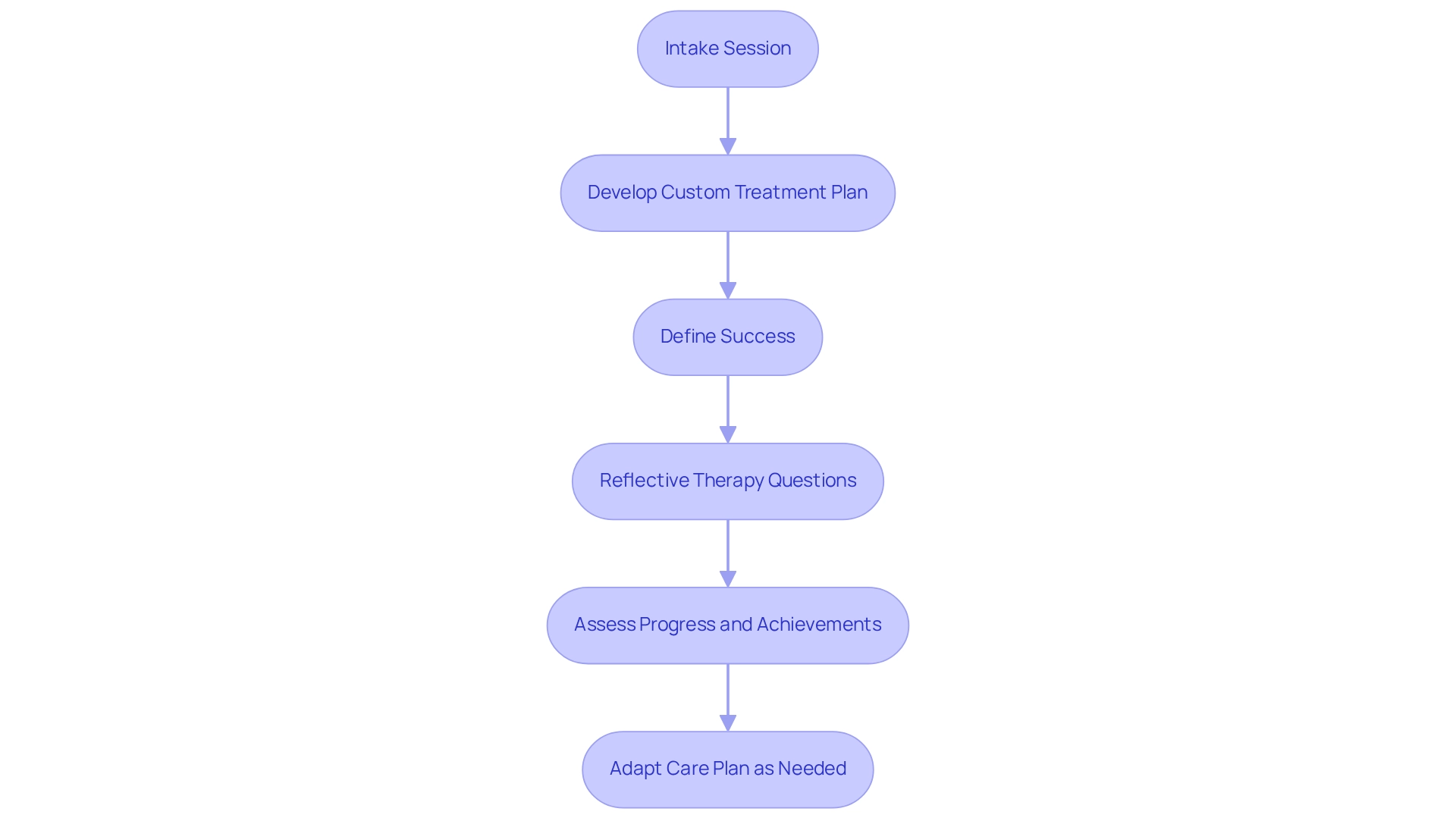
Practice Self-Compassion: How Can You Be Kinder to Yourself?
Practicing self-compassion is a transformative element in trauma recovery. Have you ever felt overwhelmed by your past? Therapy questions such as 'How can you be kinder to yourself?' invite you to consider how you might extend the same kindness to yourself that you would readily offer to a friend. This approach is essential for reducing self-criticism and nurturing a supportive internal dialogue, both crucial for healing, which can be explored through therapy questions that highlight the influence of self-compassion on mental health outcomes. Individuals who engage in self-kindness activities often experience enhanced emotional well-being, with statistical significance noted in comparisons of self-compassion scores (p-values less than 0.05). The Self-Compassion Scale, which assesses aspects like self-kindness, common humanity, and mindfulness, serves as a valuable resource in this exploration.
As we explore this further, integrating mindfulness into self-compassion activities can further improve emotional regulation and self-awareness. Mindfulness encourages individuals to observe their thoughts and feelings without judgment, allowing for recognition and validation of their experiences. Techniques like meditation and mindful breathing can be particularly effective in this regard. This method not only cultivates resilience but also supports healing by creating an environment for self-acceptance and understanding.
A case study from The Emerald Couch illustrates how envisioning a life unburdened by past struggles fosters resilience and growth. This approach not only aids healing but also underscores a commitment to high-quality, evidence-based care. Expert opinions further emphasize the significance of self-kindness in trauma recovery. Susan Gaylord, PhD, notes that practicing self-compassion can lead to improved emotional regulation and a deeper sense of connection with oneself and others. By integrating self-compassion and mindfulness into therapeutic methodologies such as DBT, ACT, CBT, and ERP, clients can cultivate a more compassionate relationship with themselves, ultimately enhancing their healing journey.
To implement self-compassion in your daily life, consider setting aside a few moments each day to reflect on your feelings and offer yourself the same kindness you would extend to a friend. This simple practice, combined with mindfulness techniques, can significantly impact your emotional well-being and support .
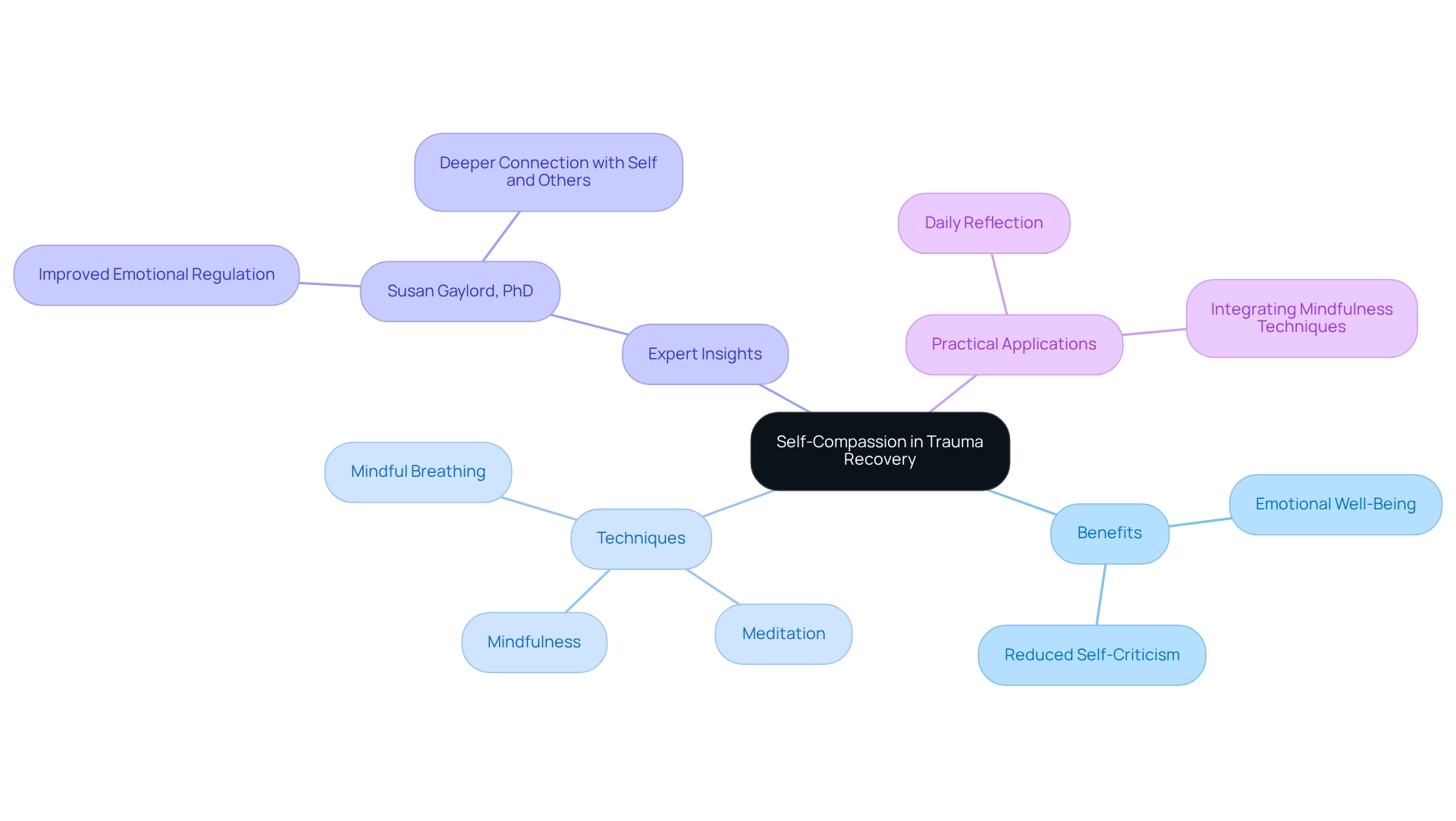
Visualize Your Future: What Does a Healthy, Happy Life Look Like for You?
Visualization serves as a transformative tool in therapeutic settings, particularly for individuals navigating trauma recovery at The Emerald Couch. Have you ever felt overwhelmed by therapy questions regarding your past? Engaging customers with questions such as 'What does a healthy, happy life look like for you?' encourages them to envision a future that transcends their past experiences. This practice not only fosters hope but also allows individuals to articulate and aspirations, thereby creating a clear path for their healing journey.
At The Emerald Couch, the treatment process begins with an intake session where therapists collaboratively develop a custom treatment plan tailored to each individual's unique vision of success. This customized method ensures that individuals feel supported and understood as they work towards their objectives.
Current research underscores the profound impact of therapy questions related to future visualization on trauma recovery outcomes. Techniques that incorporate imagery, such as compassion visualization, often involve envisioning a warm light and affirmations, fostering self-love and acceptance. These methods have been shown to enhance emotional resilience by incorporating therapy questions, allowing clients to better cope with their challenges.
Case studies highlight the importance of self-care and reflection in this process. For instance, Brittany Chaffee emphasizes the need for prioritizing mental well-being, stating, "My thirty-something best is hopefully your sixty-something peace of mind." This insight acts as a reminder that answering therapy questions about visualization techniques can greatly aid in personal growth. Furthermore, structured visualization techniques, such as peaceful meadow audio sessions lasting approximately 5:51 minutes, have been shown to effectively aid in relaxation and mental clarity, directly supporting the benefits of visualization in therapy.
To further enhance the transformative role of mindfulness, therapists at The Emerald Couch often integrate mindfulness techniques such as mindful breathing and body scans during sessions. These practices assist individuals in anchoring themselves in the present moment, facilitating engagement in visualization exercises. Expert opinions consistently affirm the power of envisioning a healthy future in therapy. Therapists at The Emerald Couch acknowledge that this method not only assists individuals in reshaping their stories but also fosters a sense of control over their lives.
To implement visualization techniques effectively, therapists can encourage individuals to:
- Create a vision board
- Engage in guided imagery exercises during sessions
Furthermore, individuals can practice mindfulness techniques at home, such as:
- Dedicating a few minutes each day to visualize their goals
- Using audio sessions to guide their practice
By fostering a supportive environment where clients can explore these visualizations, therapists can facilitate deeper healing and resilience, ultimately guiding individuals toward a fulfilling and hopeful future.
Conclusion
The journey of trauma recovery is deeply personal, and at The Emerald Couch, we understand that a tailored approach is essential for meaningful healing. Have you ever felt overwhelmed by your past? By emphasizing personalized therapy questions, our therapists engage clients in profound emotional exploration, fostering greater self-awareness and clarity. This individualized inquiry not only strengthens the therapeutic relationship but also creates a safe space where clients can navigate their experiences more effectively.
Mindfulness practices play a vital role in this transformative process, providing clients with tools to observe their thoughts and feelings without judgment. Techniques such as meditation, breath awareness, and visualization empower individuals to cultivate resilience and foster a sense of agency over their healing journey. By integrating mindfulness with personalized therapy, clients are equipped to manage stress, reflect on their progress, and articulate their goals, ultimately leading to improved mental health outcomes.
At The Emerald Couch, our commitment to high-quality, evidence-based care is evident in our focus on collaboration and open communication. By encouraging clients to express their needs and assess their support systems, our therapists can tailor interventions that resonate with each individual's unique experiences. This collective approach not only enhances recovery outcomes but also reinforces the notion that healing is a shared journey, supported by both personal reflection and community connection.
In conclusion, embracing a personalized therapy model that incorporates mindfulness and self-compassion is crucial for those navigating the complexities of trauma. By fostering a collaborative environment where clients can explore their emotions, define their goals, and visualize a brighter future, The Emerald Couch empowers individuals to reclaim their narratives and embark on a path toward lasting resilience and fulfillment.
Frequently Asked Questions
What is the approach to therapy at The Emerald Couch?
The Emerald Couch employs a personalized and compassionate approach to therapy, tailoring the process to meet the unique needs of each individual rather than using a one-size-fits-all model.
How does The Emerald Couch address trauma in therapy?
Therapy questions at The Emerald Couch are designed to address the distinct experiences of individuals navigating trauma, which helps deepen therapists' understanding of clients' emotional landscapes and fosters a safe environment for healing.
Why is personalized treatment important in therapy?
Research indicates that conventional treatment designs often fail to identify optimal therapies for diverse patient populations, highlighting the need for personalized approaches that enhance recovery outcomes.
What role does mindfulness play in trauma treatment?
Mindfulness practices, such as meditation and mindful breathing, are integrated into trauma treatment to help individuals develop awareness of their thoughts and emotions, fostering self-discovery and inner growth.
What treatment methodologies are combined with mindfulness at The Emerald Couch?
Mindfulness is integrated with various methodologies, including Dialectical Behavioral Therapy (DBT), Acceptance and Commitment Therapy (ACT), Cognitive Behavioral Therapy (CBT), and Exposure and Response Prevention (ERP).
What are the benefits of mindfulness practice in therapy?
Mindfulness practice improves stress management, emotional regulation, and self-awareness, which are essential elements for effective treatment.
How does The Emerald Couch ensure clients are paired with the right therapist?
The Emerald Couch conducts tailored evaluations to match individuals with the most appropriate therapist, and if they cannot provide the correct treatment, they offer a refund for the session.
Why is emotional awareness important in therapy?
Emotional awareness significantly enhances treatment outcomes, as individuals who engage in emotional reflection are more likely to identify and articulate their feelings, leading to more effective therapeutic strategies.
How can therapy questions help individuals in their recovery journey?
Therapy questions encourage individuals to reflect on their current emotions, helping them uncover underlying issues that may require attention and allowing therapists to tailor their interventions for better healing.
What is the significance of understanding how past experiences shape present attitudes?
Reflecting on past events helps individuals connect their experiences to current emotions and actions, uncovering insights that can guide therapeutic strategies and promote healing.
What expert advice is given regarding self-care during the healing process?
Experts emphasize the importance of disconnecting from social media and other stressors to support self-care during recovery, allowing individuals to focus on their healing journey.




